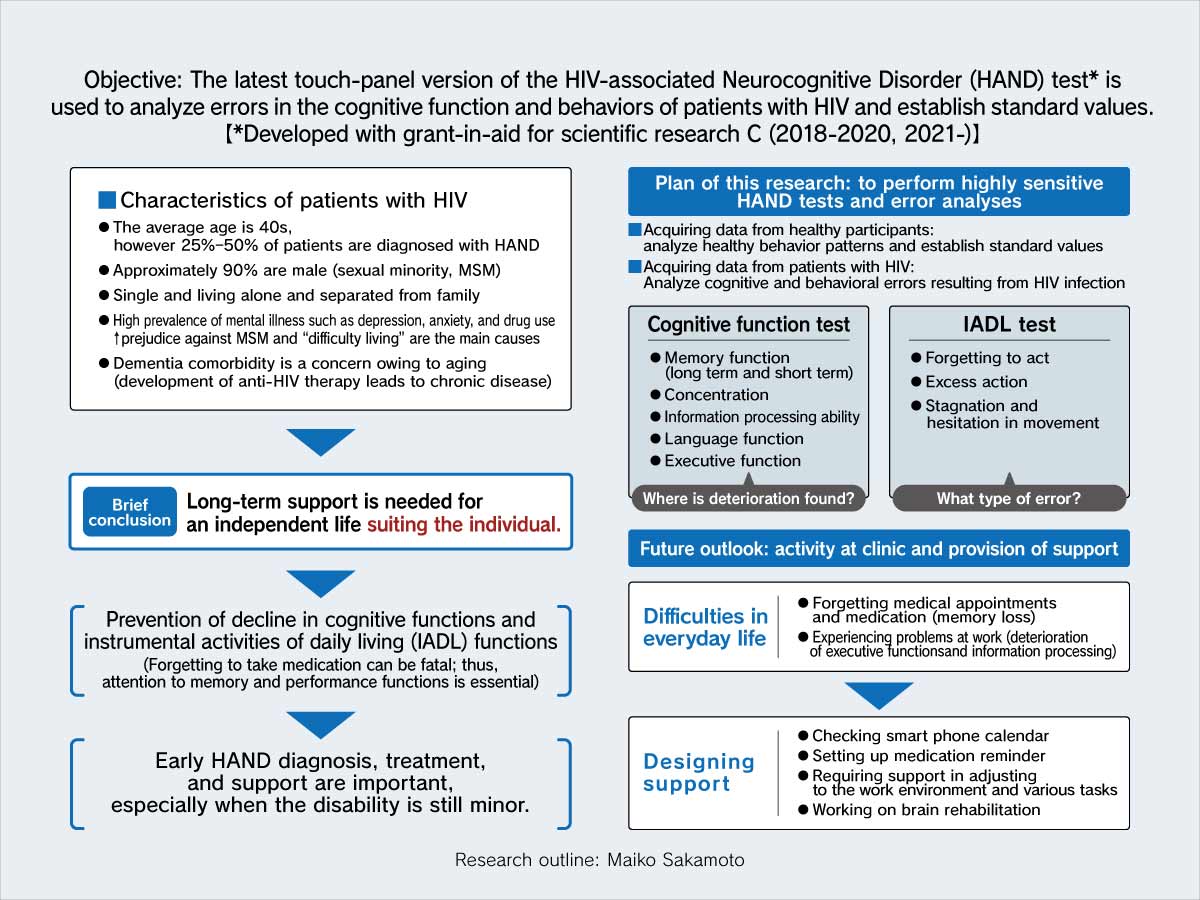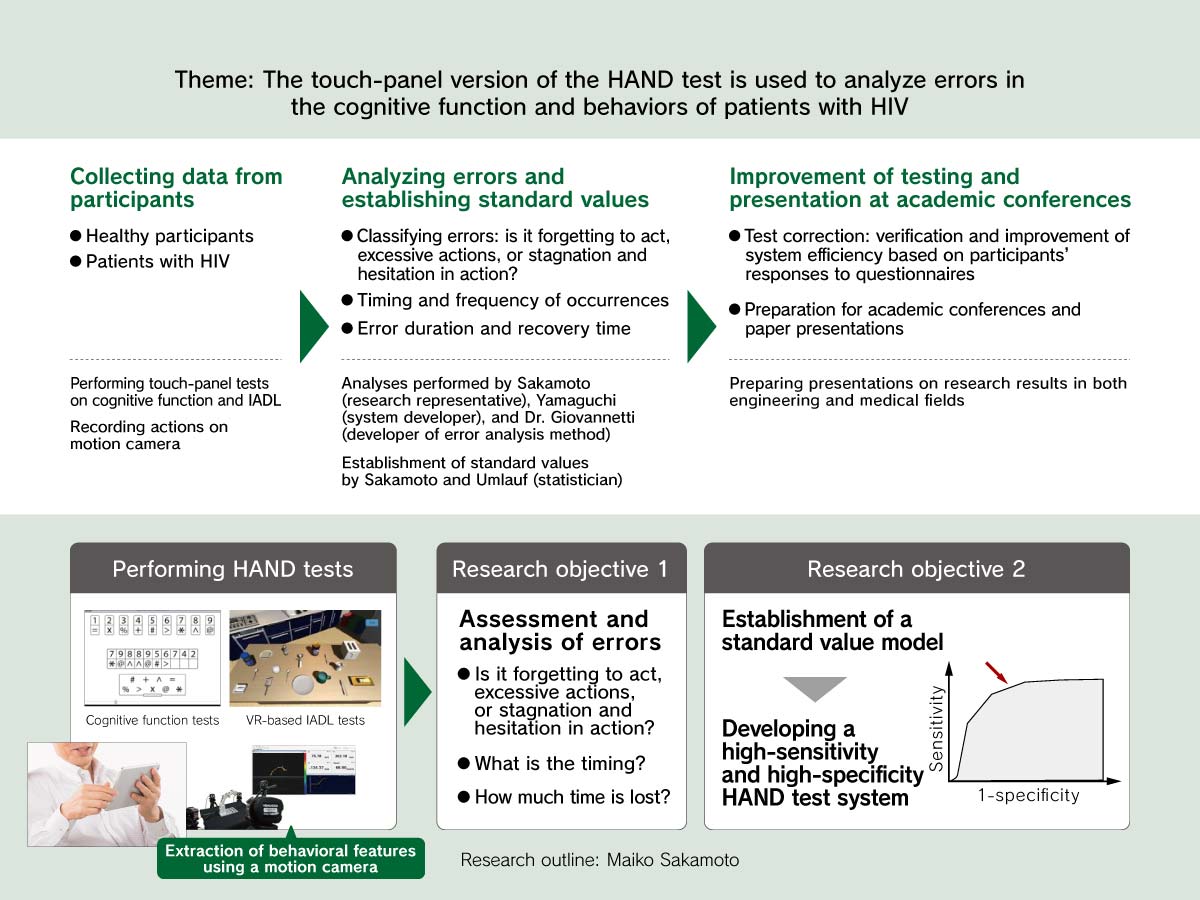Development of screening tests useful for early detection of an HIV infection-associated decline in cognitive and IADL functions (HAND)

Research overview
Aiming for early detection of various cognitive function disorders through touch-panel screening tests Extensive application of neuropsychology in Japanese society
I attended graduate school in the United States, where I was awarded degrees (M.A., M.S., and Ph.D.) and certifications (Movement Therapist, Clinical Psychologist, and Neuropsychologist). I have been engaged in clinical examinations, research, and education in the field of neuropsychology. Neuropsychology, a domain of medical science, developed in the United States and is devoted to research on cerebral functions, emotion, and behavior. Knowledge on neuropsychology is still limited in Japan, where there are only a few specialists with a background in clinical psychology as compared to those in the United States.
■ Screening tests for early detection
Making full use of the experience and knowledge I gained from the United States, I am continuing to pursue research on two major subjects for the early detection of a decline in cognitive functions.
The first subject is the development of cognitive function tests, which were adapted for Japanese nationals. I developed the tests on the basis of knowledge gained from research and development of cognitive function testing in the United States and thoroughly adapted them to the Japanese language and culture. I am now striving to construct standard values for verbal memory tests that are tailored to Japanese nationals.
The second subject is the development of a touch-panel-type screening test for the early detection of an HIV-associated neurocognitive disorder such as a decline in cognitive functions and impaired instrumental activities of daily living. With the ordinary assessment method, judgments are made on the basis of scores in tests conducted on patients. It has been found that persons infected with HIV make distinctive motor errors, and the assessment and analysis of these errors could presumably lead to earlier detection. Moving forward, I intend to further deepen this research while making extensive use of virtual reality and other means.
As Japan heads toward a hyper-aged society, prevention is going to assume great importance for the ability of senior citizens to lead independent, healthy lives. The progress of mild cognitive impairment and dementia can be halted by early detection and early intervention. I believe that this touch-panel testing will be of value as one of the means of such early detection.
Testing by using touch panels would enable diagnosis at medical care sites with a shortage of staff and for remote patients. At the same time, it also has the benefit of encouraging even those who are averse to testing to receive tests casually, as if playing a game. It is thought that this could possibly lead to early detection. Furthermore, the addition of motion capture devices, cameras, and other equipment makes it possible to analyze fingertip motion and movement, which is increasing hopes for application for early detection and intervention.
■ What can be done as viewed from the perspective of neuropsychology?
Besides conducting research on screening tests, I am involved in medical psychology, medical ethics, and medical education. I have also been researching medical student outlooks on ethics and professionalism and changes in self-directed learning capabilities over a period of six years. In response to the spread of COVID-19, I am currently also discharging a vital role in the form of providing care for students who are having mental health problems or are having difficulty learning.
Based on my experience overseas, I counsel medical students who want to study abroad for language learning or develop a career outside Japan, and I am putting energy into diverse activities aimed at helping each and every person engage in work on equal terms as a human being. I likewise disseminate information on a wide range of agenda items, including ways of balancing family and work, increasing the appointment of women to high positions, and conditioning environments to facilitate work by women.
Neuropsychology is a branch of learning that is going to expand in Japan from now on. In this connection, I am taking vigorous action in a wide range of fields. For example, I am promoting knowledge and the introduction of cognitive disorder testing and brain checkups and serving as chairperson of the first Asian conference of the International Neuropsychological Society.
Message
Let us work together for the construction of care sites that will enable human resources capable of activity internationally, as well as highly motivated researchers and educators, to exercise their talents on an equal footing.
Main publications
- Thaler, N. & Sakamoto Pomeroy, M. (2022). Neuropsychological Considerations with Japanese Patients. Cultural Diversity in Neuropsychological Assessment: Developing Understanding through Global Case Studies. pp. 228-240. Routledge, Tylor & Francis Group. (DOI: 10.4324/9781003051862-31)
- Komatsu K, Kinai E, Sakamoto M, Taniguchi T, Nakao A, Sakata T, Iizuka A, Koyama T, Ogata T, Inui A, Oka S. (2019). Various associations of aging and long-term HIV infection with different neurocognitive functions: Detailed analysis of a Japanese nationwide multicenter study. Journal of NeuroVirology, 25(2), 208-220.
- Sakamoto, M. (2016). Neuropsychology in Japan: history, current challenges, and future prospects. The Clinical Neuropsychologist, 30(8), 1278-1295.
- Sakamoto, M., Hilsabeck, C.R., Hammel, M., Barakat, F., Hassanein, T., & Perry, W. (2015). Neuropsychological functioning among individuals infected with hepatitis C: A comparison on pre- and post-transplant performance. Neuropsychological Trends, 17, 67-83.
- Sakamoto, M., Marcotte, T.D., Umlauf, A., Franklin, D., Heaton, R.K., Ellis, R.J. et al. (2013). Classification accuracy of HIV dementia Scale in a large, well-characterized HIV-seropositive cohort. Journal of Acquired Immunodeficiency Syndromes, 62(1), 36-42.






